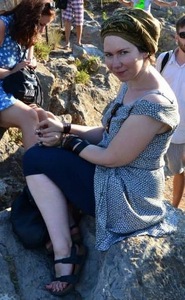Aušra Kaziliūnaitė: I never wanted to live in poverty 1
In brief: A conversation about creation with the poet, author of two books and active participant of literature field Aušra Kaziliūnaitė is presented.
The poet speaks about her liking to keep a kind of diary, to put down memories and preserve them in this way. Poetry for her is an opposite from the diary – poems never profess the flat truth of fact.
“Poetry is born and dies in polysemy. Art that reflects things that happen with you also creates a new world. Therefore, if you want to remember something in many years, I don’t think a poem will always help to do it as it lives for itself. It testifies about its own world. Poems, differently from diaries, cannot exhume the past as their world is timeless and eternal,” the poet speaks.
Aušra Kaziliūnaitė asserts that she has to experience something new all the time, to face challenges and to have time for retreat and for reflecting all things – all this is necessary for creation.
As for economic conditions and their impact on the artist’s productivity and art quality, the poet states that economic conditions are important; however, it is hard to say who personally was assisted or hindered by poverty or wealth in creation. “I myself never wanted to live in poverty. I would like to ask whether some artist wanted this a lot?” the artist reveals.
The poet also touches the problem of books publication, dissemination and people’s power to buy them. Poetry does not interest publishers as it is not profitable. An alternative is electronic books, which should spread according to the poet.

